A team of NHS occupational therapists (OT) are being introduced in GP practices in Somerset, including in the Burnham-On-Sea area.
The OTs, employed by Somerset NHS Foundation Trust (FT), will work as part of a more diverse team in the county’s primary care networks (PCN) – which are groups of GP practices providing primary care services to a specific area or population in Somerset.
Earlier access to occupational therapy is great for patients as it offers holistic and preventative support to help people live independently in their preferred home setting.
The new service is already up and running in five PCNs – with more to follow over the next two years. A total of seven OTs are in post so far.
It’s another example of health and social care organisations in Somerset working hard to offer different services that help to prevent people from becoming unwell, before they might need additional care or treatment in hospital by offering access to a specialist OT assessment and treatment, closer to home.
The service has been co-produced with primary care colleagues and is based on the successful First Contact Physiotherapy model that many patients will now identify to be part of their wider GP practice team.
Becky Keating, Somerset FT’s head of occupational therapy, says: “We are very pleased to be able to extend our OT service into GP practices, bringing our unique skills into the well-established teams who know their local people.”
“Our OTs spend their time working within our primary care network multidisciplinary teams on a range of healthcare priorities, such as enhanced health in care homes, anticipatory care, responding to health inequalities, early cancer diagnosis, cardiovascular disease and reviewing medications.”
“The service is proactive rather than reactive and uses the latest technology to help us reach out to those at risk of developing long term conditions.”
Nicola Mead, Somerset FT’s professional lead occupational therapist, explained how the service is helping patients to stay well at home.
“Instead of only responding to people who are at risk of admission to hospital, we can help that middle group of patients,” she said. “This means before they reach a crisis we look at how they can live well at home to make sure all of their needs are met.”
Recruitment into the service has been very successful with lots of interest from people wanting to develop these innovative services that use the full range of skills as OTs.
“We’ve worked closely with each primary care network to look at how they can use the service to respond to their individual population needs, which will vary across Somerset,” Becky added.
“Developing the model across Somerset so we can offer services that are relevant to local populations can be complex, but it’s a challenge we are excited to meet.
“Many occupational therapy roles in primary care are emerging across the UK but we believe the way we’ve set this up in Somerset as a host model is unique.
“By being employed by our NHS trust, our OTs get the support, governance and terms and conditions of an NHS contract, while gaining valuable experience and support from colleagues in primary care.”
The six PCNs involved so far include West Somerset, Taunton Deane West, Taunton Central, West Mendip, North Sedgemoor and the Chard/Langport/Ilminster network.
“Some of our PCN OTs are reviewing the people who attend our emergency departments or GP practices frequently and who may be disengaging with health and social care services,” Nicola continued.
“The role of an OT has been so important in this as we’ve been able to give those patients the time and space to understand why they are presenting at those services.
“We help them to look at their overall health and wellbeing so we can potentially redirect them to an appropriate service. This could be engaging with other organisations in the community to provide them with a key contact, such as the voluntary sector or other health and social care colleagues.
“A lot of work is happening in care homes too, not just medically, but ensuring that people enjoy a good life so their experience in a care home is similar to that of their own home.
“We look at what’s important to each individual, including what would give their life a purpose so they feel they want to get out of bed every day. Our excellent voluntary sector partners help with this and it’s making a real impact in helping to avoid them being admitted to hospital.
“OT can offer support to care home colleagues as we understand that residents have increasingly complex needs. We can offer strategies and advice to help residents remain active or able to engage in their chosen occupations, leading to improved wellbeing.
“We offer the service to people of any age, from ‘cradle to grave’. It’s not about diagnosis but more about the practical things that people need to do and how we are able to support them in the best way.
“Recently we saw a patient who needed a posture and seating assessment so we assessed how we could maintain his mobility. He shared his previous interest of cycling so we worked together with the voluntary sector and our partners at the Somerset Activity & Sports Partnership to bring that activity into his care setting, bringing his passion back to him.
“We were also recently able to help a man get out to an evening at the Royal British Legion so he could connect to people who have a link in his military past. This was all about understanding what was important to him and making it happen through the provision of a wheelchair.”
Pictured (left to right): Helen Rostron and Hattie Stevens – both Primary Care Network Occupational Therapists.







